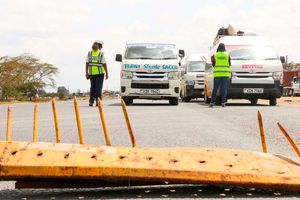
Jimmy Kibaki
| Evans Habil | Nation Media GroupPolitics
Premium
Jimmy Kibaki: The untold story of my father’s presidency
When your father becomes president your circumstances change. For Jimmy, son of Kenya’s third president Mwai Kibaki, those changes came in the form of heightened security around him and increased scrutiny.
Jimmy talks to Justus Wanga about how his father’s presidency impacted the family, the anxiety the cameras couldn’t capture, the powerbrokers who ran the show behind the scenes, and the perception of animosity between the Kibakis and the Odingas.
****
I had to change my telephone numbers every four or five months during my father’s time as President. I was highly sought after, even internationally. I’d wonder how people got my number, but having said that, my parents, especially my mother, set a clear divide on what is government and what is family. Even before my father became president, we never mixed the two.
You have to recognise that it was Mzee who was elected President, not his family. In fact the term “First Family” didn’t sit very well with us because we thought we were just an ordinary Kenyan family which was lucky enough to have the father as President. It was a huge honour, but he was the president, not us.
But one cannot talk about my father’s presidency without making reference to the accident just days to assuming office. My father rose to the presidency at a very extraordinary time for my family, because, if you recall, on December 3, 2002 he was involved in a serious road accident.
I remember seeing him that evening at the Nairobi Hospital. It was the hardest thing for us as a family. Mzee, a man who was over 70 at the time, had suffered extensive injuries. It was a very stressful time. He was flown to the UK where he stayed for about two weeks. When he came back he was still in pain. He was sworn in as President of Kenya on a wheelchair.
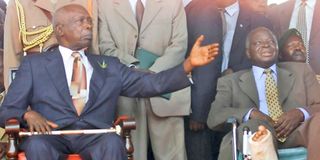
President Daniel arap Moi (left) during the swearing-in ceremony of Mwai Kibaki as new president on December 30, 2002.
Tense moment
There was also a tense moment on Madaraka Day in 2003, courtesy of his injuries. Some of us seated at the podium who knew the extent of his injuries and how unwell he was were holding our breath and willing him on. I looked at my mother and I could see the struggle.
Her hands were clenched. She was almost telepathically willing her husband on and after the guard of honour those who knew what it had taken for Mzee to do that were so proud of him... and also relived that it had ended well. It was a huge moment and for a lot of people that was when his presidency actually begun.
From then on, he started working from the office. Some days he would work full day and others half day, depending on how he was feeling, but the President was now back.
The anxiety preceding the Nyayo stadium event was momentous. There had been debate on whether he would go to the podium to read the speech or do it from the seat. Clearly, this was a function the President could not afford to delegate.
Mind set
As early as February 2002 Mzee had his mind set on how he would run the affairs of the State. He always sets himself goals and work towards them. He’d tell you to set a goal before you embark on something and see if you’re going to achieve it. What are the possibilities? What are the other goals? Have you set yourself for the impossible? If you have, don’t embark on the journey, but once you’ve embarked on it you have to reach your goal.
So in February of 2003 he said he was going to inspect the guard of honour on his two feet, four or five months to the day. And that was his focus, so he underwent sometimes excruciating physiotherapy sessions.
He was determined to inspect that guard of honour without a walking stick, even though some of his doctors in the UK had said it would be impossible, given his age.
It wasn’t a very long speech, really. He just wanted to make this point. And the main theme of that speech on Madaraka Day was that Kenya was going to be a working nation. I think even the headline of the Daily Nation the following day said exactly that, “a working nation”.
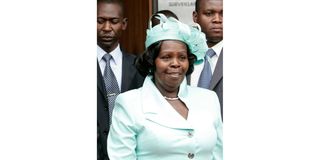
Former First Lady Lucy Kibaki.
Pillar of the family
Behind the scenes during this time, my mother was the enduring, strong pillar of the family. As they say, the man is the head of the family and the woman is the neck. And the neck, as an analogy, is what makes the head stay in position. It supports it. In my family, my mother was always the pillar in good or bad times. The life of our family always revolved around her, and she was a very hands-on mother.
She had been a businesswoman who gave up the business to look after the family. She had a shop in Westlands, Nairobi, and another shop at the corner of Wabera Street and Mama Ngina Avenue. She was also a farmer but decided to leave all that to attend to her young family.
While she ran the family during Mzee’s indisposition, other people took charge of government affairs, of course under his keen eye. I didn’t have a real bird’s eye view of the events, but from what I could observe, there was a small group of ministers who oversaw the running of the state.
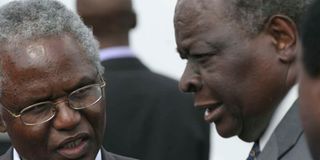
Former President Mwai Kibaki talks to Mr Francis Muthaura (left) at JKIA.
The person who appeared to be the overall in-charge was the Head of Public Service, Francis Muthaura. He had unfettered access to the President, which at that time was very limited to the others within the inner circle, including Christopher Murungaru, Kiraitu Murungi and David Mwiraria.
Mzee maintained a very small closed group as he discouraged people coming to State House and encouraged them to seek whatever services they wanted from Harambee House, from where Muthaura operated.
And then, obviously, there was State House Comptroller Matere Keriri. It was a very difficult time for him, having an incoming president who was indisposed. That somehow took the wind out of his sails.
Petty infighting
When a president is indisposed there appears to be a vacuum. No, not a vacuum per se, because he was present, but you can still sense the void. Because of that, there was a lot of petty infighting within the government. People had been assigned jobs and duties as ministers but they lost the bigger picture.
Before the Narc government came into power there had been a strong desire among Kenyans to change the country. That’s how Narc became a strong political juggernaut after years of Kanu’s misrule.
Kenyans wanted a fresh beginning. The President might have been injured, but as he recuperated, the new government still needed to run. The feeling was that the government should get down to work because there was so much to be done. Kenyans expected no infighting or disagreements as to who was to do what since roles had been clearly spelt out.
I believe that had my father not been involved in that accident, the character of his presidency would have been very different. There would have been more unity in the country during his presidency, and he would have wanted to achieve even greater things than he did. He was a unique unifying factor, and in terms of seniority he was head and shoulders above the rest.
Correct Kanu wrongs
The whole idea was to correct the wrongs of Kanu, and that is why when Mzee became President he put politics aside and got down to work, to fix the economy.
Ten years later, when he retired, the economy was doing very well but Kenyans got to appreciate how well the economy had done 10 years after he retired. They even stared wishing he could done another 10 years. So, focus. That is the key.
Had people taken a more focused approach despite the President’s indisposition, had they helped him run the government instead of glancing over their shoulders to see who was more powerful than the other, or who was doing better than the other, things would have turned out much better.
In a country like Kenya, the way the government is set up, it is the Head of Public Service who runs the government on a day to day basis. Francis Muthaura, the holder of that office at the time, was totally loyal to the President and exceedingly powerful.
The beauty of being a civil servant is that you are not beholden to anyone else other than the President, so Mzee gave him instructions and people did not realize that the decision Muthaura made were the President’s.
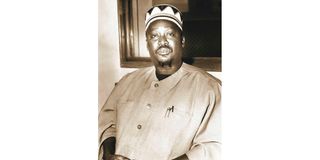
The late opposition leader Jaramogi Oginga Odinga.
Kibakis and Odingas
That, perhaps, fuelled this perception of animosity between the Kibakis and the Odingas. Nothing, though, could be further from the truth. A bit of history: My father was working as a lecturer at Makerere, Uganda in 1959 when Jaramogi Oginga Odinga went to visit Milton Obote, who at the time was the head of the Uganda People’s Congress.
The two countries were not independent yet and UPC had a manifesto that impressed Jaramogi. When Obote told him that a young Kenyan lecturer had written it, he said he wanted to meet him.
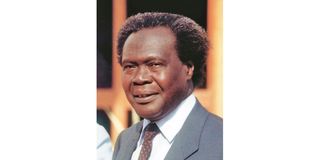
Former Ugandan President Milton Obote.
That young Kenyan was my father, and after meeting with him, Jaramogi convinced him to come back to Kenya and made him the first Kanu executive officer.
That’s how my father’s political journey began. Were it not for Jaramogi, Kibaki might not have gone into politics as his focus had been in education. Jaramogi even bought my father his first car, a Volkswagen Beetle, arguing at the time that my father needed the car to travel around the country and popularise the party.
My father, therefore, has huge respect for Jaramogi; and Raila, conversely, has huge respect for my father. You see, politics should never be personal. Even when we were in the opposition I used to ask Mzee: “How come you are campaigning here yet your business partner from the ’60s, President Moi, is the one you are running against?”
He would answer: “Some of these companies have taken more than 30 years to build, should we dissolve them because of politics?”
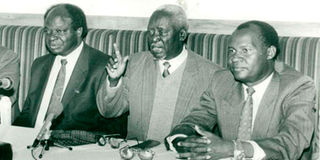
Opposition leaders, from left, Mwai Kibaki, Oginga Odinga and Johnstone Makau at a past event.
Not Moi’s enemy
He taught me that “business is business and politics is politics”, and that he was not Moi’s enemy, only that he thought he could do a better job running the country than him. Obviously, if you’re doing business with somebody there’s something about that person that you like. Politics is just competition, and at the end of the day people should shake hands since there is always next time.
My father says he did his job to the best of his ability, and that it’s upon Kenyans to judge him. That said, he wishes some things had been done differently. For instance, he feels the ’90s was a lost decade. He would have wanted to retire early in his life.
He was ready to be President in the 1990s when he was in his 60s but circumstances didn’t allow him. Also, he feels the country would be far much better economically had it been run better in the 1990s. In terms of the conduct of our politics, Mzee regrets what he calls a lack of a sense of nationhood and patriotism among Kenyans.
He says Kenyans elected him to fix the economy, but as soon as the Narc government came into power, they started focusing on politics, on their heroes and why they had not been named ministers. Or why Raila was Prime Minister.
After the fiasco of the 2005 referendum and that 2007 election there was a needless political atmosphere, yet the whole idea was that the people who wanted to remove Moi and Kanu from power had actually done that.
Raila Odinga
Raila Odinga has made a huge contribution to this country but many people don’t see it. Most of the freedoms we enjoy today are due to him. We know it. He suffered for it. He was detained, tortured and imprisoned for them. How many times has he almost lost his life?
But do I think he should be president? I know him personally, so I could say he deserves it, but I’m yet to see his manifesto. Electing a president is not romance, you could be my best friend but if I feel you don’t have the capacity to lead the country, I would not vote you. We are shareholders in this country and so we care about the he direction the country will take.
To put it more bluntly, I know someone whom I can’t vote for. I have my reasons, and they are not personal. I don’t think that the individual, whom I won’t name, has what it takes to maintain the stability of this country. I have young children. I have to think of them first before I think about anything else. Politics has become very cynical. Politicians don’t mean what they say; they just say things to flatter us. But Kenyans know how to decipher what is true and what is not.
Some people feel the country lost an opportunity in the 2005 referendum to change the laws of the land because Kibaki betrayed his compatriots, and then there was the falling out with Raila. That period was hugely distractive for the President.
Here you are, having been sworn in as President with a huge task to do, economic growth is in the negative, you’re indisposed, yet you have a fractured government. And don’t forget many of these people who were in the Kibaki government had, just three months earlier, been in Kanu — Raila, George Saitoti, Kalonzo Musyoka... name them.
So, you’re already recovering from your accident, you’re recovering from a stroke, you’re trying to get your blood pressure back, I mean, you’re not well, man. You’ve got so many things in your mind that you want to do. The last thing you want is your Cabinet ministers getting involved in power games.
Side shows
There were a lot of side shows. They then started seeing the 2005 referendum as an opportunity to settle scores, not an opportunity at Constitution making. Had they seen it that way, I think history would have been very different, but they decided to fight him. When you decide to fight a President, he’s not going to take it lying down.
If you were to discuss issues with my father, you’d certainly arrive at the realisation that he is not an unreasonable man. Had they engaged him directly, they would have gotten something. But, again, life is such that I cannot subdue my interests to accommodate yours. We can find a balance. They were looking at it from a personal point of view. What was good for the country was already in place. Had they sat down with the President the constitution we got in 2010 would have been in place five years earlier.
Kibaki succession
There was a lot of push and pull around the Kibaki succession in 2013, with some suggesting that he preferred Musalia Mudavadi and not Uhuru Kenyatta to replace him. So whom did he, really, prefer? To answer that question, allow me to paint a scenario about Mzee and Uhuru for you.
My father is President Kenyatta’s godfather, the godfather of Jomo Kenyatta’s favourite son. When the young boy was born, my father is the one who suggested the name ‘Uhuru’ to Jomo since Kenya was in the cusp of independence. When Uhuru walks into a room, my father lights up. He loves seeing his godson. We’ve grown up together. Uhuru, his brother Muhoho and sister Nyokabi and we the Kibaki children went to the same kindergarten, the same primary school and the same high school. I’ve known Uhuru since I was three, more than 50 years ago.
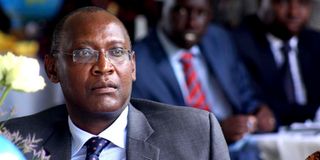
Mr Muhoho Kenyatta.
Now, back to the succession matter. There were three elements around the President when he was about to retire; those rooting for George Saitoti and those who wanted Musalia Mudavadi were all drawn from the civil service and business community, and then there were those rooting for Uhuru. His stature had grown so much in Mt Kenya as the next leader after my father that you couldn’t ignore him. He commanded a huge number of voters.
Most agreeable candidate
The pro-Musalia camp argued that he was the most agreeable candidate across the nation and the most peaceful, with some telling the President that the country was not ready for another Kikuyu head of state after him, and that Uhuru carried the ICC baggage anyway.
Those supporting Musalia even managed to block Uhuru from reaching the President. When it came to my attention I went and told the President and the State House Comptroller was almost fired on that day. That was one of the few times I saw my father shouting. He was very upset. He told the comptroller that Uhuru was the only person allowed to go to State House without the requirement of an appointment since “he’s my neighbour” (Uhuru has a family home bordering State House in Nairobi).
A lot of people were not happy with me for the intervention. There were many attempts to influence my father but he went by what the Wazee (the elders) wanted, especially my mother. He was never going to change that. He then indicated to the military and the intelligence whom his preferred successor was for their own preparations. As a practice, such establishments must know what the retiring president is thinking in terms of choice of a successor, even before the elections.
Support Uhuru
At my mother’s funeral service at Consolata, Uhuru said that if it wasn’t for my mother his history would have turned out differently. The First Lady had put her foot down and told everyone that she and the President were going to support Uhuru to succeed my father. Moi was in that category of Wazee and he did the most work. For that generation, it was largely because of the reverence they had for Uhuru’s father, not the capabilities they thought he had as a leader. Of course Uhuru is a charismatic, down-to-earth leader, but to that generation he was simply the son of Jomo.
In his early political life, my father had backed Moi to succeed Jomo, breaking ranks with the pro-passing-cloud faction. When Jomo became president he was in, I think, his mid-70s and most of his Cabinet members were in their 30s and early 40s. They looked up to him as a father figure. Jomo’s system had strict adherence to order and protocol, so that the hierarchy within government was well known. People did what they were supposed to. The system was efficient.
Jomo operated from Nakuru State House. That was his main residence and the government in Nairobi functioned well. He appointed Daniel Moi his vice in 1967.
The vice-president, because of his unassuming mien, underwent a lot of tough times but Jomo stood by him so that those who supported Moi were supporting Jomo’s pick of a possible successor since he was growing old and not in very good health.
Those in government — the ministers and security apparatus — who supported Moi supported constitutional order and stability. In the event the President was incapacitated or died, it was clear what would follow. That’s why when Jomo died a Cabinet meeting was called very quickly, and at that meeting Moi was almost guaranteed the presidency.
Moi had overwhelming support. People wanted stability. The magnitude of Jomo’s death was immense as he was almost synonymous with Kenya. There was a lot of sadness, fear and uncertainty. Even for a lot of people who didn’t like him it was very unsettling, but the constitutional order prevailed. Moi became president and the rest is history.
Dropped as VP
Moi later humiliated my father by dropping him as VP and making him Health minister. For Mzee’s supporters, that was betrayal because Moi had demoted the most capable person in his government for purely political reasons. There had been murmurs at the time that Moi should pave the way for the more competent Kibaki. Life is like that.
If you’re not ready to leave a job, the person people are looking at to replace you must go. It’s human nature. This happens even in the private sector; if you are a threat to your boss, you become a marked man.
Mzee took it in his stride and did a very good job at Afya House. He knew he was capable of being president of Kenya and so he kept his cool.
There were family fears when Kibaki bolted out of Kanu for DP and ran against Moi in 1992. Moi was a strong-man president, so obviously there was a bit of trepidation about what was going to happen. Moi was more captive of his hardliners. That is understandable, because any drastic change in a country — and anywhere else — comes with a lot of sacrifices. For instance, my doctor told me I needed to lose some 15 kilos. That meant going to the gym. It meant a lot of pain. Kenya was transiting from a one-party system and there was going to be a lot of resistance, a lot of pain, especially by and to those motivated by fear of losing political power.
Some have called my father kĩguoya, Kikuyu for coward, because of his brand of politics, yet to others it is excellent tact. Much as Kenyans love combative politics, my father refuses to engage in an argument for the sake of it. He’s never been that kind of a person.
Post-election violence
That is why the 2007 post-election violence was perhaps the most distressful period in my life, and maybe his, too. To some people around the President, the concept of a coalition government or government of national unity did not make any sense. They would not allow it. Mzee had to sit down alone with Raila Odinga to bring calm to the country.
And he needed to, for leadership requires a high level of responsibility. If you don’t have that, then you shouldn’t be in leadership. You’re responsible for the lives and wellbeing of Kenyans, especially when you’re the President. That is what you swear to do when you are inaugurated.
Right now people are talking about next year’s election in the context of Deputy President William Ruto, Raila Odinga and Musalia Mudavadi, but if something serious happened today we would all look in one direction, that of President Kenyatta, because our safety and wellbeing is his responsibility. So after the 2007 election it was the President’s responsibility to bring the country back to normal. And he did it.
During the violence nobody was looking at Raila Odinga because, in the hearts and minds of Kenyans, it was the President’s responsibility to heal the country, so he had no choice but to do the handshake with Raila. He didn’t do it for fun. Maybe he didn’t even want to do it, but it was his responsibility.
There are those who believe that it is was the swearing in of my father in the evening that sparked off the violence. I don’t think so. It has been argued that there was a constitutional reason why it had to be done that way in order to avert a vacuum, but there are two elements that, in my view, triggered the chaos; the chaos had been planned, and then there was the spontaneous civil disobedience.
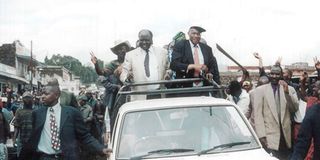
Mwai Kibaki (left) and Prof George Saitoti during campaigns in Ngong
Civil disobedience
People have a right to civil disobedience, of course, but when that turns into violence then the security arms of the government have to move in to protect life and property.
Justice Johann Kriegler said he could not tell who between Kibaki and Raila won the 2007 presidential elections but I think my father won by a narrow margin, and data by the Electoral Commission of Kenya showed as much.
History is kind. When you review these events with the benefit of hindsight they become a lot clearer. Winning or losing an election is not a do-or-die contest. Leaders have a lot of responsibility, especially in a country like Kenya where supporters think politics is actually a personal enterprise. It’s not.
My father never sought the presidency for personal glory or power. He firmly believed that, as president, there were dreams, goals and certain themes he could achieve for Kenya.
The whole idea of service to the nation is totally alien in the public sector today. Yes, he did business, but who says you cannot be a minister and do business? As long as you’re not doing business with the government, there is no problem. The primary goal of many in my father’s generation was to serve this country, and it came from a place of deep love.
Extra-ordinarily lucky
My father loves Kenya in ways many of us cannot comprehend. His reasoning comes from a point of knowing that he was extra-ordinarily lucky every step of his life. From the time the Catholic missionaries took him from Gatiani village in Othaya to Karima School, from the time the British government gave him a scholarship to study at Makerere University and at the London School of Economics, from the time Jaramogi brought him from Uganda to Kenya, and the time Jomo Kenyatta appointed him a Cabinet minister and Moi appointed him Vice-President, he had it all worked out for him. And then he became President in 2002.
Now Mzee is retired, and before I talk about his life in retirement let me just say that, because my friend Uhuru is retiring at a relatively young age, I hope he has planned his life well because being President is an incredibly busy job and it all ends suddenly. There’s a telephone line in State House called ‘The Hotline’. In my dad’s time it was a red phone that had no dial out, meaning you could only receive calls. That phone never rings with good news. When it rings, you know there is trouble. It can ring any time, so you’re always on, always on the job. You can even be woken up at 2am.
Every day you get intelligence briefings. It’s normally the first thing in the morning, and some of those briefings are quite daunting. We don’t even know 10 per cent of what goes on in the security sector in this country and what constitutes a national security threat, but the President does and is always agonising on how to keep the country safe.
When one is the occupant of State House, one’s life is very structured. President Kenyatta’s programme for the next two or three weeks has already been printed out. He knows exactly what he will be doing and where he will be next Wednesday. He can change it or something can happen to change it, but it’s already been planned.
Now you go from all that, where everybody wants to talk to you — from the man on the street to the Deputy President — you go from all that to total silence. I see it with my father. It’s quite daunting. Sometimes the phone never rings. From all that busy schedule you have now to worry about “what am I going to do today?”
Sadness
There was some form of sadness when Mzee left State House, because first of all he didn’t feel he had accomplished all that he had wanted to do, and you’d be surprised how short 10 years can be. Then there was also a lot of uncertainty about what he was going to do next, because it’s important for people to keep busy.
But also we knew that, from a purely family perspective, it was good for us because for the first time in our lives we had our father all to ourselves. Tomorrow morning I can wake up and go have breakfast with him and spend the whole day with him if I want to. It was even better for the grandchildren because those born during his presidency didn’t really know him because of the nature of the job.
Initially, Mzee would work from his Nyari estate. People would come to see him but it was still not the same in retirement. It can be lonely at times, especially since my mom was not there when he retired.
Authority
I guess what one would miss most, just like any normal human being, is the authority. When a sitting president requests you to do something, it may come out as a request but it is a directive. What he wants done may come out in the form of a question but he expects it to be implemented. And then you go from all that to retirement. It takes a lot of adjustment.
Also, for him, he had been in government all his adult life, except for a few years when he was in the opposition. For him now, retirement could have been a good time to focus on the family.
It might have been hard initially, because life is characteristically hard for men, especially when they’re older, but I could be wrong. Most men will not agree with me, but I know women are a lot stronger than men mentally to cope with some of these things.
Some things are hard to deal with. My mother died in April 16, 2016 and in August Mzee got very sick. We even had to evacuate him very quickly to South Africa. Doctors said he had some blood clots in the head but I strongly believe it was because of the grieving. When he came back he lost so much weight that it got us very worried. For me, 2017 became the hardest period. I also lost a lot of weight because that’s when I started feeling my mother’s loss. For Mzee, it was huge. They were married in 1960. That was 56 years spent together. He eventually came to terms with it but it’s still hard.
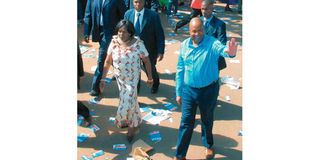
Mama Lucy Kibaki and her son Jimmy Kibaki arriving at Uhuru Park for a PNU rally..
I miss my Mother
It’s also hard for me. The beauty of having a mother when you’re my age is that you can go and discuss anything with her. I could tell my mother anything. I could even cry in front of her because you trust your mother with anything. I miss the chats and advice. Sometimes when you’re stressed you just want to go out and talk to your mother. She’s not going to solve all your problems, but it’s therapeutic.

Jimmy Kibaki with his daughter during Lucy Kibaki’s requiem mass at Consolata Shrine Catholic Church in Nairobi on May 4, 2016.
The death of our mother affected Mzee a lot. This was someone he was used to having breakfast and dinner with every day, and then suddenly she was not there. It was quite hard for him as we, the children, were all grown up and didn’t live with him.
It was not easy for him but we rallied around him, just as we do today. He knows we’re never far away from him. He is getting old. He’ll be 90 on November 15, but he’s fine. I mean, in his heart, he feels he did his duty.




